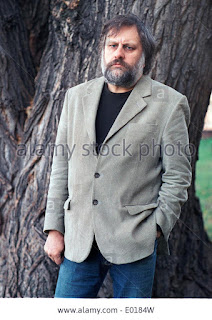“playfully Hegelian”
[I]t needs to be recognized that instead of being an “interdisciplinary philosopher” or “playfully Hegelian,” Žižek elevates the most un-Hegelian idea of all, arbitrariness, to be his guiding method. Throughout a long book [i.e., Did Somebody Say Totalitarianism?] he brings up dozens of topics without providing any coherent explanation of why he chooses to discuss one topic rather than another. Thus, even someone sympathetic to a specific opinion can never be entirely sure whether Žižek will stand by his own case, or will simply drop it as he flits to another topic. In addition, though he quotes and makes allusions and references to a wide variety of well-known authors and canonical works, he does not provide reasons for his views of the cited texts. Rather, he makes highly tendentious assertions and expects his readers to submit to what are supposed to be apodictic statements. Should they be skeptical, they can be told that Žižek is above “standard” treatments and that he is following a dialectic.
David Pickus, "Did Somebody Evade Totalitarianism? On the Intellectual Escapism of Slavoj Žižek", Humanitas Vol 21, Nos. 1 & 2, 2008
